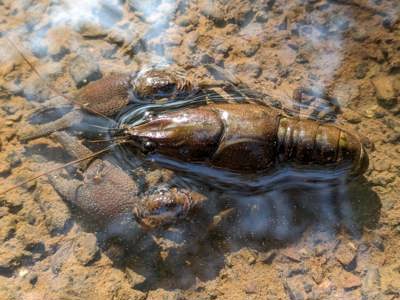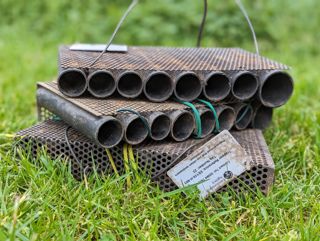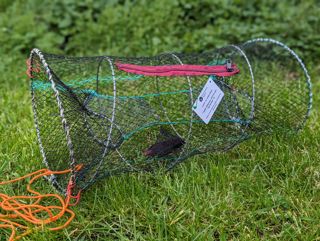
Blog
Led by the Wildwood Trust, the Saving Devon’s Native Crayfish project is the latest project to step up white-clawed crayfish (WCC) conservation efforts in Devon.
Thanks to funding from Natural England Species Recovery Programme, the project is developing a new crayfish hatchery, building a bespoke crayfish ark site pond, and telling the story of WCC conservation through a new public display at Wildwood Trust Devon
Following a successful trial period in early 2023 (funded by Devon Community Foundation), Natural England funding is enabling Wildwood Trust Devon to expand the crayfish hatchery facilities to accommodate native crayfish from across Devon and Somerset.

Guided by crayfish hatchery specialist from Bristol Zoological Society, the Wildwood Devon Team have converted redundant fish rearing tanks into a state-of-the-art crayfish hatchery.
The large tanks contain a gravel layer on the bottom, and pipes and engineered bricks mimic natural habitat for crayfish to hide in.
Water temperature and chemistry is carefully controlled, and water quality is checked regularly to ensure the crayfish have the optimum conditions for breeding.

The hatchery is a crucial element of the measures being taken to save Devon crayfish from extinction.
WCC are being gradually rescued from Devon rivers and moved to the hatchery where they will breed over the winter.
The team are also attempting to capture ‘berried’ female crayfish (carrying eggs) each spring, and the females will be cared for at the hatchery to ensure the eggs hatch.
The hatchery will eventually be able to accommodate up to 500 crayfish in 8 separate tanks.
Once the crayfish are at least 18 months old, they can be moved to ‘ark sites’ to establish larger breeding populations.
Eventually these ark site crayfish will be used for future releases back into Devon rivers (at locations where they safe from the threat of invasive species and poor water quality).
Captive Breeding Success!
In January 2024 the hatchery team found berried Creedy Yeo females.
This means the crayfish rescued from the river in 2023 successfully mated in the hatchery!
Surveys to rescue WCC from Devon rivers are undertaken by the Wildwood Devon crayfish team who have the necessary specialist Natural England WCC survey licences.
The team also need a separate Natural England licence to be able to take WCC from the river to the hatchery, and Environment Agency trapping permits to be able to use any kind of crayfish traps. Landowner permission is also required.
Over the next few years, the survey team are targeting ‘hot spots’ in the Creedy Yeo and Culm to rescue as many crayfish as possible. These are stretches of the river where WCC have previously be found and give the survey team the best chance of finding more.
The Devon survey team use two different trapping survey methods:

Artificial refuge traps (ARTs)
Also referred to as ‘panpipe’ traps, are the most reliable and easy to use traps.
They are attached to trees on the riverbank and positioned on the bed of the river, weighed down by a large rock.
The plastic tubes mimic natural habitat and crayfish shelter inside.
As crayfish (and other aquatic creatures) can come and go as they please, these traps can safely be left in the river for long periods.

Baited traps:
These come in a net or plastic basket version and work best in deeper water.
A bait (usually frozen marine fish) is used to attract crayfish who crawl into the trap and can’t escape.
A narrow entrance hole prevents otters or other aquatic wildlife becoming trapped.
Unlike the ART, they physically trap crayfish and so have to be checked and emptied every 24 hours.
Wildwood Devon public crayfish display
From summer 2024 Wildwood Devon visitors will be able to find out more about white-clawed crayfish conservation through a new visitor display.
The display will tell the story of crayfish in Devon and explain the latest conservation methods being used to safeguard the species from extinction.
Visitors will be able to see captive raised WCC in an aquarium display and learn about crayfish lifecycles.







